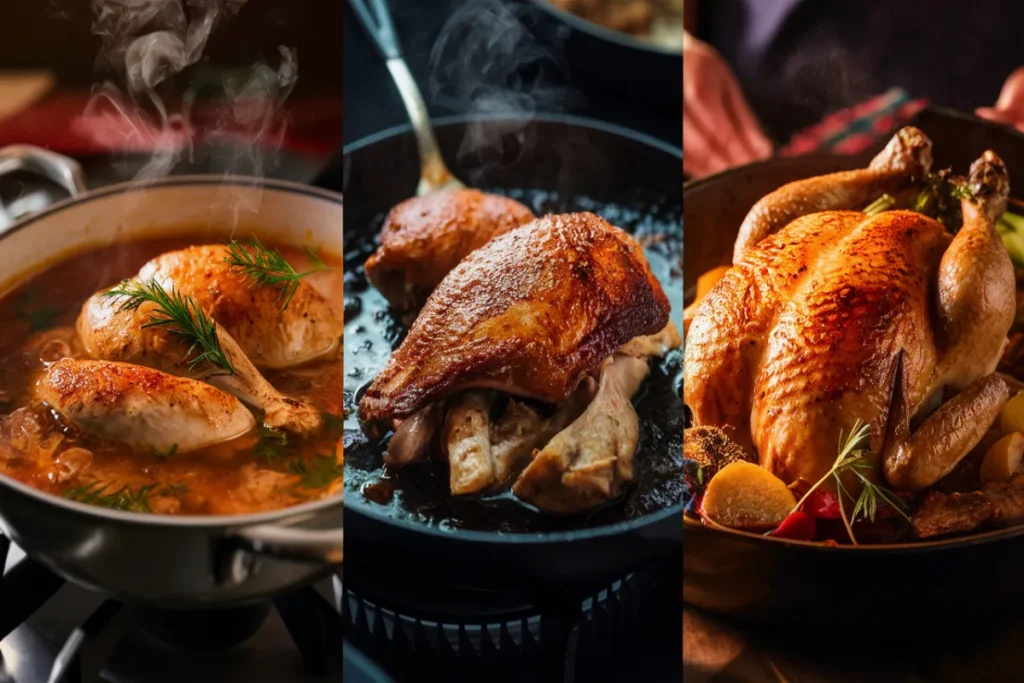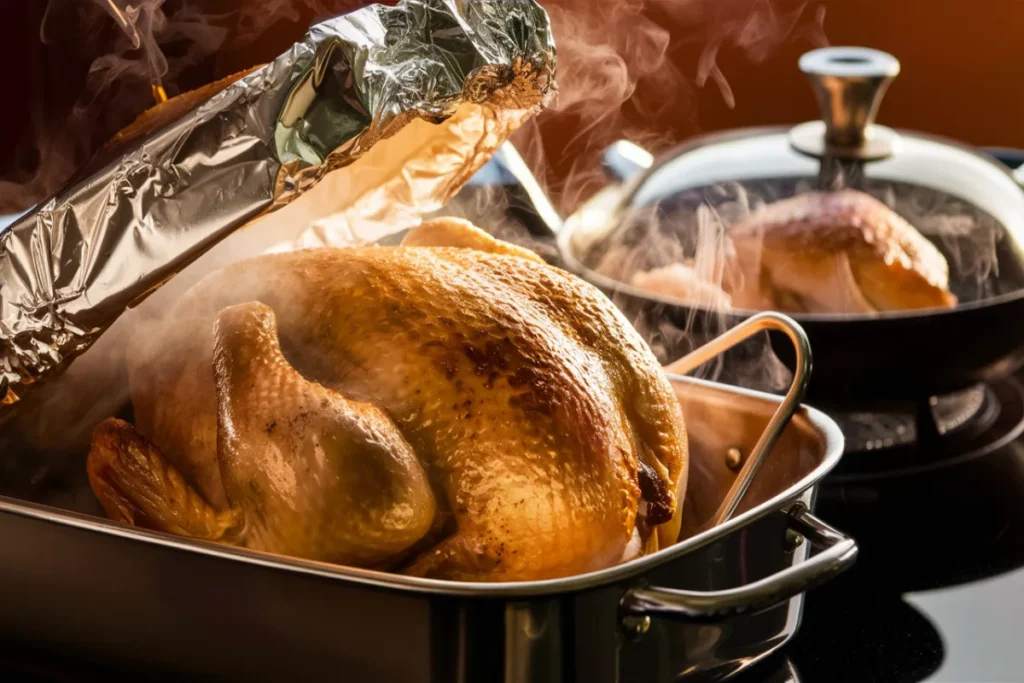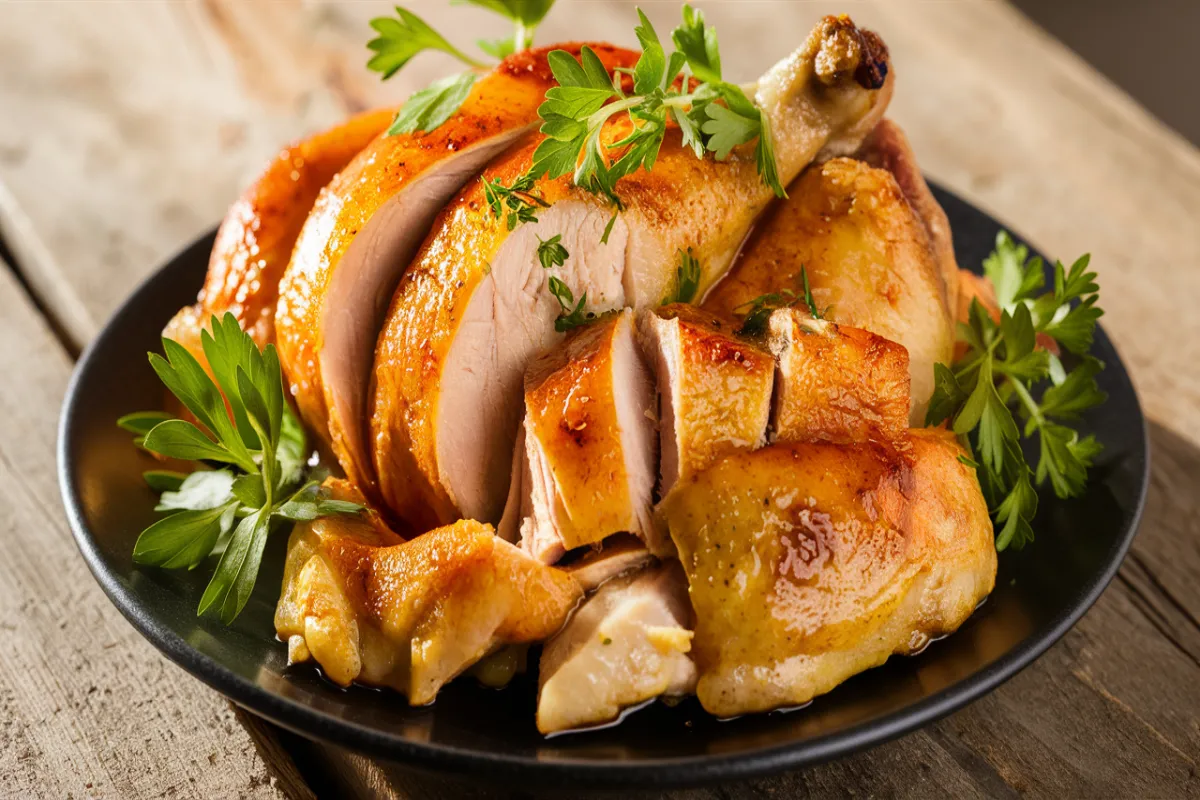Everyone loves moist, flavorful chicken. Dry, tough chicken can ruin a meal, leaving you disappointed. Achieving moist chicken, however, doesn’t have to be difficult. The secret lies in specific cooking techniques, choosing the right cuts, and using simple methods to lock in moisture.
In this article, we’ll explore the best tips, techniques, and methods to keep your chicken moist every time. Whether you’re roasting, grilling, or sautéing, these secrets will help you serve juicy, tender chicken without fail.
Choosing the Right Chicken Cut
Start by choosing the right cut. Bone-in, skin-on chicken stays juicier than boneless, skinless breasts. Dark meat, like thighs and drumsticks, contains more fat, making it naturally moister than white meat.
If you prefer chicken breasts, try pounding them to an even thickness. This helps them cook evenly, avoiding dry edges and an undercooked center. Always keep an eye on your cooking time when working with chicken breasts, as overcooking them quickly leads to dryness.
Use Bone-In Chicken for Maximum Moisture
Bones help insulate the meat, preventing it from drying out. Bone-in cuts retain more moisture during cooking, providing a juicier result. If possible, choose bone-in pieces for recipes that require longer cooking times.
Marinating for Tender, Flavorful Chicken
Marinating your chicken infuses it with flavor while also tenderizing the meat. Use a combination of oil, acid, and seasoning for the best results. Oils, like olive or vegetable oil, create a protective barrier on the chicken, locking in moisture. Acids, such as lemon juice or vinegar, break down the proteins, tenderizing the meat.
Avoid marinating chicken for too long. Prolonged exposure to acid can actually toughen the meat, rather than making it tender. Stick to 30 minutes to four hours for marinating chicken breasts, thighs, or drumsticks.
Use Dairy-Based Marinades for Extra Tenderness
Consider using dairy-based marinades, such as yogurt or buttermilk. The calcium in dairy products activates enzymes in the meat, making it especially tender and juicy. This works particularly well with fried or baked chicken.
Brining: A Moisture-Locking Method
Brining is another fantastic method for ensuring moist chicken. Soaking the chicken in a solution of water, salt, and sometimes sugar helps the meat retain moisture during cooking. Brining works by altering the muscle fibers, allowing them to absorb more liquid.
For optimal results, brine chicken for at least 30 minutes, but no longer than six hours. The salt not only adds flavor but also helps the chicken stay juicy. Brining particularly benefits lean cuts, like chicken breasts, which tend to dry out faster.
How to Make a Simple Brine
To create a simple brine, dissolve 1/4 cup of salt in 4 cups of water. Submerge the chicken in the brine, refrigerate it, and let it soak. For extra flavor, add herbs, spices, or sugar to the brine.
Cooking Techniques for Moist Chicken

The way you cook your chicken matters greatly when aiming for a moist outcome. Certain cooking methods lend themselves better to maintaining moisture. Let’s look at a few of the best options.
Low and Slow Cooking
One of the best secrets to moist chicken is cooking it low and slow. This method allows the meat to cook evenly without drying out. Roasting or braising chicken at a lower temperature (around 300°F) helps retain moisture, especially for larger cuts or whole chickens.
Braising: A Foolproof Technique
Braising involves searing the chicken first, then slowly cooking it in a flavorful liquid. This technique keeps the chicken moist while infusing it with rich flavors. Consider braising chicken thighs or drumsticks in broth or wine for a deliciously moist result.
Sous Vide: Consistent and Perfectly Moist
Sous vide is an excellent technique for keeping chicken moist. This method involves cooking the chicken in a vacuum-sealed bag submerged in water at a precise temperature. Sous vide ensures consistent cooking, preventing overcooking and preserving the chicken’s natural juices.
Poaching for Delicately Moist Chicken
Poaching is a gentle cooking method that keeps the chicken moist and tender. Submerge the chicken in simmering liquid, such as water or broth, and cook it gently. This method works especially well for chicken breasts, which tend to dry out when exposed to high heat.
Resting Your Chicken After Cooking
One of the most overlooked secrets to moist chicken is resting it after cooking. When you remove chicken from heat, the juices are concentrated near the surface. Letting it rest for five to ten minutes allows the juices to redistribute throughout the meat.
If you cut into the chicken immediately, those juices will spill out onto the plate, leaving the meat dry. Always rest your chicken, covered loosely with foil, before serving.
Resting Ensures Maximum Juiciness
Resting locks the moisture inside the chicken. The fibers relax, absorbing the juices for a more flavorful bite. This step applies to all cuts of chicken, from breasts to thighs to whole roasted chickens.
The Importance of Internal Temperature
Cooking chicken to the proper internal temperature is key to keeping it moist. Overcooking causes the juices to evaporate, leaving the chicken dry and stringy. For safe, moist chicken, aim for an internal temperature of 165°F.
Use a meat thermometer to check the temperature, especially when cooking thicker cuts. Insert the thermometer into the thickest part of the meat to ensure accuracy. Cooking to the correct temperature ensures that your chicken stays juicy and tender.
Avoid Overcooking at All Costs
Overcooking remains the primary cause of dry chicken. Keep a close eye on cooking times and temperatures to avoid this common pitfall.
Basting: Keeping Chicken Moist During Cooking
Basting involves spooning or brushing pan juices or marinade over the chicken as it cooks. This technique helps keep the surface moist, adding flavor while preventing the chicken from drying out.
You can baste roasted chicken with melted butter, oil, or its own cooking juices. For grilled chicken, baste with a marinade or sauce every few minutes to lock in moisture.
Basting Adds Flavor and Moisture
Basting keeps the exterior moist and flavorful. Regular basting helps the chicken remain juicy, even in high-heat cooking methods like grilling or roasting.
Searing: Locking in Juices from the Start
Searing chicken before cooking it through can help lock in moisture. The high heat caramelizes the outside, creating a barrier that helps keep the juices inside. Sear chicken in a hot pan with a small amount of oil for one to two minutes per side.
After searing, finish cooking the chicken in the oven or reduce the heat to cook it through on the stovetop. Searing works well for thicker cuts like breasts, thighs, or whole legs.
A Crispy Exterior, Moist Interior
Searing creates a crispy, flavorful crust while keeping the inside tender and juicy. This technique adds both texture and moisture retention to your chicken.
Covering Chicken While Cooking

Covering chicken while cooking can trap steam, keeping it moist. When roasting or baking, cover the chicken with foil during part of the cooking process. Remove the foil toward the end to allow the skin to crisp up.
Covering also helps when sautéing or pan-frying. Placing a lid on the pan traps steam, ensuring that the chicken stays tender while cooking through.
Crisp and Moist Balance
Use this method for dishes that require both moisture retention and crispy skin. Covering the chicken during the initial cooking stage locks in moisture, and uncovering it later allows for a crispy finish.
Grilling Chicken Without Drying It Out
Grilling chicken can be tricky. The high heat often leads to dry, overcooked meat. However, you can keep chicken moist on the grill by using a few key techniques.
Use Indirect Heat for Thicker Cuts
For thicker cuts, like chicken breasts or thighs, what is the secret to moist chicken? Cook over indirect heat. Place the chicken away from the flame, allowing it to cook slowly without burning or drying out.
Direct heat works better for smaller, quicker-cooking pieces like wings or drumsticks. Always monitor the cooking time closely to avoid overcooking.
Marinate Before Grilling
Marinating before grilling helps keep the chicken moist and flavorful. The oils and acids in the marinade create a protective barrier, preventing the meat from drying out on the grill. Use a marinade that contains oil, vinegar, or citrus juice for the best results.
Grill with the Lid Closed
Keep the grill lid closed to trap heat and moisture. This helps the chicken cook evenly and prevents it from drying out. Open the lid only when necessary to check for doneness or to baste.
Using a Meat Thermometer for Perfect Chicken
One of the best tools for discovering what is the secret to moist chicken is a meat thermometer. This tool allows you to monitor the internal temperature, helping you avoid overcooking.
Insert the thermometer into the thickest part of the meat, making sure it doesn’t touch bone. Remove the chicken from heat as soon as it reaches 165°F.
Check out this guide on the best tools for home improvement
Preventing Dryness with Precision
Using a meat thermometer takes the guesswork out of cooking chicken. You’ll know exactly when it’s done, preventing the dry, overcooked results that come from guessing.
Letting Chicken Rest After Cooking
Resting chicken after cooking is crucial to retaining moisture. What is the secret to moist chicken? One important step is letting it rest. As the chicken cooks, the juices move toward the surface. When you remove the chicken from heat, let it rest for five to ten minutes before cutting.
This allows the juices to redistribute, ensuring moist, juicy chicken throughout. Skipping this step causes the juices to escape when you cut into the chicken, resulting in dryness.
Maintain Juiciness Every Time
Resting chicken locks in the moisture, giving you tender, juicy results every time. Whether you’re grilling, roasting, or sautéing, always let your chicken rest before serving.
Avoiding Common Mistakes That Lead to Dry Chicken
Many common cooking mistakes lead to dry chicken. Avoid these errors to ensure moist, flavorful results every time.
Overcooking
Overcooking is the most frequent cause of dry chicken. Keep a close eye on cooking times, and always use a thermometer to check for doneness.
Skipping the Resting Step
Skipping the resting step can cause the juices to spill out, leaving the meat dry. Always let the chicken rest for a few minutes after cooking.
Not Marinating or Brining
Failing to marinate or brine your chicken leaves it vulnerable to drying out. These methods help lock in moisture and infuse the meat with flavor.
Final Thoughts: Mastering the Secret to Moist Chicken
What is the secret to moist chicken? It doesn’t have to be a mystery. By choosing the right cuts, using marinades or brines, and mastering key cooking techniques, you can ensure that your chicken remains juicy and flavorful every time.
Remember to cook chicken to the correct internal temperature, let it rest, and use moisture-retaining methods like basting or covering. Follow these secrets, and you’ll discover what is the secret to moist chicken in every meal you prepare.

